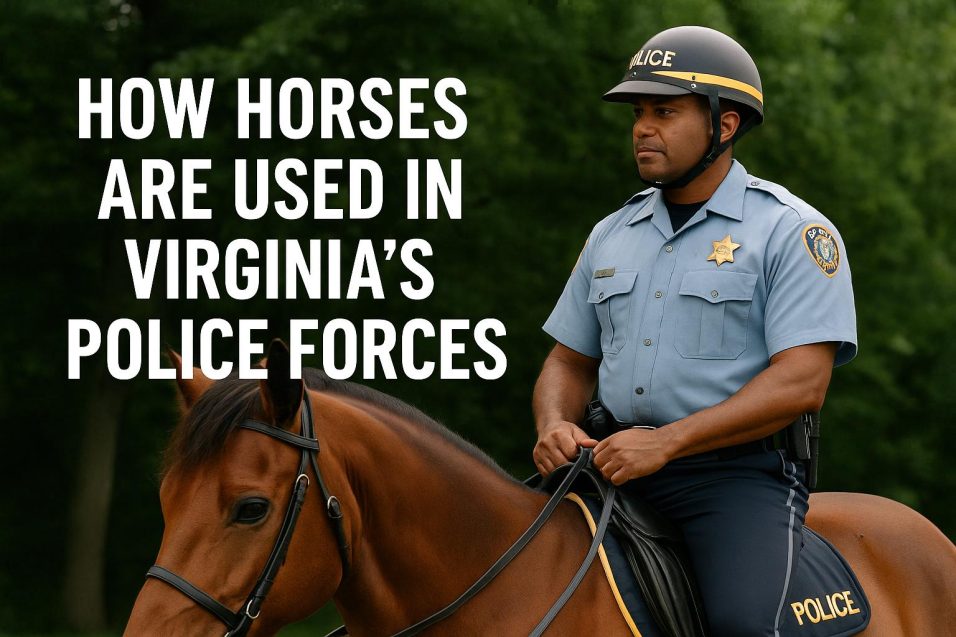Introduction to Horses in Virginia’s Police Forces
In Virginia, horses play a pivotal role in certain police forces, offering an array of benefits that complement modern policing methods. While they may seem like a traditional mode of transportation compared to automobiles and other technology-driven tools, horses serve unique functions that prove invaluable in law enforcement.
The Role of Mounted Police Units
Mounted police units in Virginia utilize horses primarily for crowd control, patrol duties, and as a means to foster public relations. The physical presence of horses can be imposing, which is particularly useful in managing large crowds during events such as parades, demonstrations, and concerts. In urban and rural landscapes alike, the sight of mounted units provides a multifaceted approach to law enforcement that brings both a sense of nostalgia and modern efficiency.
Patrol Duties: In areas where vehicles may not be practical, such as parks and rural landscapes, horses provide a practical solution. Mounted officers can traverse terrains that vehicles cannot, making them particularly effective in expansive parklands and during search and rescue operations. Moreover, the agility of horses allows them to swiftly navigate tight spaces and densely packed areas, highlighting their versatility in diverse environments.
Public Engagement: Horses also serve as an excellent bridge between law enforcement and communities. Their presence often invites positive interaction, helping to build trust and rapport between police officers and the public. This role is not only beneficial for community policing strategies but also humanizes the police force, making law enforcement more approachable and accessible to citizens of all age groups.
Training and Care of Police Horses
Training for police horses in Virginia is thorough and ensures the animals are well-prepared for various situations. The training encompasses desensitization to loud noises, crowds, and unexpected movements. This is vital for maintaining control during tension-filled situations, allowing officers to manage their mounts effectively even in the most chaotic scenarios.
Care and Welfare: The welfare of police horses is of paramount importance. They are provided with adequate shelter, nutrition, and regular veterinary care to ensure they remain in optimal health. Each horse usually receives personalized attention to cater to its specific needs. The emphasis on equine welfare reflects a deep respect and concern for these animals, acknowledging their indispensable role in public safety operations.
Furthermore, the rigorous training programs also prepare the horses for diverse weather conditions and terrain types, ensuring they perform their duties regardless of external factors. Routine check-ups with veterinarians ensure any minor health issues are addressed promptly, maintaining the physical condition required for heavy-duty activities.
Benefits of Utilizing Horses in Policing
The use of horses in policing brings several benefits. Beyond their physical capabilities, horses can bring an element of visible policing that offers reassurance to the community. They afford a higher vantage point to officers, enhancing visibility and allowing them to monitor situations more effectively. This vantage point advantage is especially beneficial in crowded areas, where an elevated view can help in identifying potential issues before they escalate into serious problems.
Furthermore, the presence of horses can contribute to a heightened police presence without being aggressive. This non-threatening approach can be crucial in maintaining peace during potentially volatile events. Horses can serve as a calming presence, deterring troublemakers just by their majestic and composed demeanor.
Additionally, mounted units often require less maintenance in specific scenarios compared to vehicles, which need fuel and regular mechanical attention. In ecological terms, horses offer a greener alternative for rural or park patrols, committing to sustainable practices within law enforcement.
The symbolic importance of horses in law enforcement cannot be understated either. They serve as a reminder of the storied history of policing and are a testament to time-honored traditions that continue to hold relevance in today’s fast-paced society. Mounted units often draw the public’s interest at community events, making them effective in educating and engaging citizens about the roles and duties of police forces.
Future of Horses in Virginia’s Law Enforcement
The future of horse units in Virginia’s law enforcement agencies remains promising. As communities value both tradition and effective policing, horses are likely to remain a fixture in various jurisdictions. Innovations in training and care continue to evolve, ensuring that horses remain effective in their roles. Beyond technological advancements, building upon existing best practices will ensure that these horse units operate at their peak potential.
While modern technology marches forward at a rapid pace, the role of animals in police work highlights a fundamental law enforcement tradition. This partnership between humans and horses underscores a unique blend of history and progress, symbolizing a balanced and adaptive approach to policing.
For those interested in this unique aspect of law enforcement, the continued integration of mounted units echoes a commitment to versatile community-oriented policing. Officers trained in these units not only hone their skills in traditional enforcement but also become ambassadors of goodwill, showcasing the ongoing harmony between urban development and historical practices.
For more information on how horses are utilized within specific police units, you can visit official Virginia government resources which offer further insights into this unique aspect of law enforcement. These resources provide valuable insights into the logistics, strategies, and broader implications of maintaining horse units within a modern policing framework.


